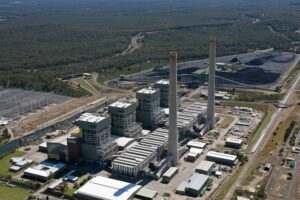As the world’s carbon emissions passed a critical threshold, and Australia’s Coalition government re-boots plans to limit the activities of environmental activists, another new study has been released that demolishes claims by fossil fuel proponents that coal will end poverty.
The “coal is good for humanity” line – based on notions it will cure poverty, address global hunger and may even have prevented the Ebola outbreak – has been pushed by the coal industry in recent years in a desperate attempt to justify new projects and fight back against emissions regulation.

The campaign has been enthusiastically embraced by Australia’s Coalition government. Prime Minister Malcolm Turnbull last year said coal would play a key role in “alleviating hunger and promoting prosperity right around the world”.
On Tuesday, he doubled down on that claim, insisting that “coal is going to be an important part of our energy mix, there is no question about that, for many, many, many decades to come, on any view.”
But a new report from a dozen poverty and development organisations – including the UK-based Overseas Development Institute – says it is absurd to suggest that coal is the secret to solving global poverty and hunger issues.
“In fact, the opposite is true,” says the new study. It notes new coal will not help those already close to the grid who cannot use the energy because of huge connection costs, and it will be of no help to the majority of electricity poor households who live in rural areas far from the grid.
The answer, it says, lies in renewables, particularly solar and wind. “If scaled up appropriately, distributed renewable solutions will be the cheapest and quickest way of reaching over two-thirds of those without electricity. Clean and safe cooking is mostly achieved through access to cleaner fuels and stoves, not by more coal power.
“The evidence is clear: a lasting solution to poverty requires the world’s wealthiest economies to renounce coal, and we can and must end extreme poverty without the precipitous expansion of new coal power in developing ones.”
The report is not the first to dismiss the coal industry claims. The World Bank came to a similar conclusion last year.
But its findings are timely given new data by the World Meteorological Organisation that shows the earth’s atmosphere permanently passed the 400 parts per million (ppm) threshold in 2015. WMO expects the levels to stay above 400ppm for generations to come.
It also comes as the Coalition government, with the Murdoch media acting as chief attack dog, flags renewed attempts to curb environmental groups by making it illegal for them to take court action against projects in which they do not have a direct interest.

Environment and energy minister Josh Frydenberg confirmed plans to change the rules, saying that the current legislation has led to “vexatious litigation” and cost “billions of dollars” in lost opportunities for development and jobs.
“Quite clearly, groups are undertaking these legal challenges to disrupt and delay projects, to make them unviable, to increase investor risk,” Frydenberg told the ABC.
Well, yes. In much the same way, it might have been pointed out, that the foreign companies that own much of Australia’s resource and coal projects have deployed millions of dollars in advertising campaigns and lobbying efforts to disrupt and delay climate and renewable energy legislation, to make renewable energy projects and other investment proposals unviable and to increase investor risk.
Turnbull, struggling to maintain his leadership in the face of polls that show him less popular than Tony Abbott was at the time he was deposed, also sided with Frydenberg, saying that there was too much delay in mining approvals.
“Nobody wants to take shortcuts on environmental matters, least of all me,” Turnbull said on a Brisbane radio station, the Guardian reported. “But there has been far too much delay.”
Turnbull’s support for coal and the new push to introduce legislation to curb environmental groups, follow his about-turn on renewable energy and the decision by the Coalition to use the recent blackout in South Australia as an excuse to try to force state governments to abandon their more ambitious renewable targets.
The new report, meanwhile, says that coal is given too much credit for the reduction of extreme poverty.
 China is often cited as a model for using coal to reduce poverty, but the report points out that the biggest drivers of poverty reduction were agricultural and macroeconomic policy changes before its coal-led expansion in the 1990s. And China is now trying to curb the runaway coal consumption as it tries to deal with huge levels of pollution in its cities.
China is often cited as a model for using coal to reduce poverty, but the report points out that the biggest drivers of poverty reduction were agricultural and macroeconomic policy changes before its coal-led expansion in the 1990s. And China is now trying to curb the runaway coal consumption as it tries to deal with huge levels of pollution in its cities.
“Coal’s environmental and climate impacts present a clear threat to people living in poverty. Air pollution from coal causes some 670,000 premature deaths a year in China and 100,000 in India,” the report says.
A one gigawatt plant in Indonesia could cause 26,000 premature deaths over its lifespan. Building just a third of the planned coal-fired power plants, mostly in developing Asia, would take the world past 2°C of warming, pushing hundreds of millions into extreme poverty before the middle of the century.
It also points out that South Africa, is the cheapest place in Africa to generate coal-fired power, yet electricity from its new 4.7 gigawatt Medupi advanced coal plant will cost at least double the original estimates and will also cost 17% more than the electricity generated from South Africa’s 2 gigawatt of new onshore wind power.
A new report from South Africa’s main scientific research organisation notes that wind and solar are nearly half the cost of new coal plants.
The report also quotes the World Bank President Jim Kim: “If the entire region implements the coal-based plans right now, I think we are finished … that would spell disaster for our planet.”









